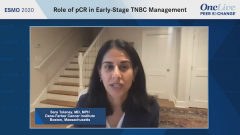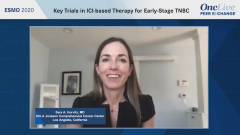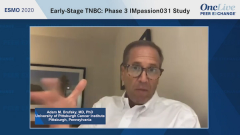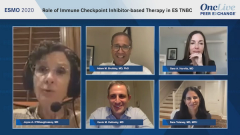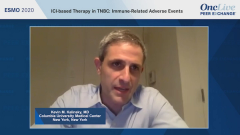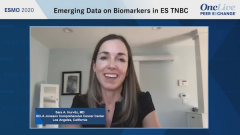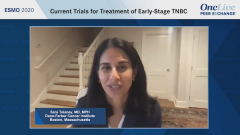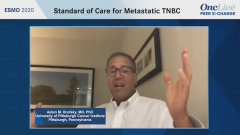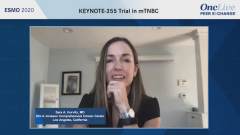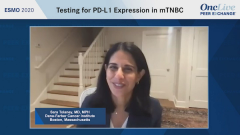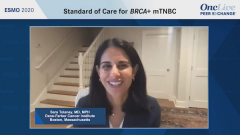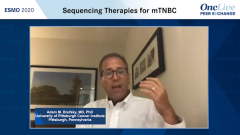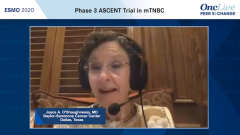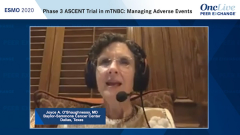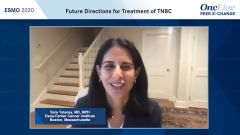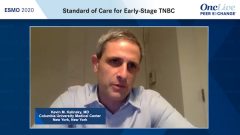
Key Trials in ICI-Based Therapy for Early Stage TNBC
Episodes in this series

Joyce A. O'Shaughnessy, MD: Let’s talk about immunotherapy because that’s really the next hope for our patients. Sara Hurvitz, maybe you could tell us about some of the data perhaps we already knew going into ESMO [the European Society for Medical Oncology Virtual Congress 2020], in terms of the immune checkpoint inhibitors in the early stage setting, and then we can hear from Adam on the new data that came out with IMpassion031 at ESMO this year.
Sara A. Hurvitz, MD: Absolutely. We’ve had a number of clinical trials that have reported out neoadjuvant treatment with immune checkpoint inhibitors. To just name a few, there was the KEYNOTE-522, the NeoTRIP trial, and the I-SPY study, which we hear about a lot of times because it has arms that open and close all the time. It just seems to be the ubiquitous I-SPY study. We also have the GeparNuevo study. Just to focus on the first 3, the I-SPY trial is an open-label, randomized phase 2 trial with adaptive design, and it’s evaluating stage II and III breast cancers of different subtypes.
Patients with HER2-negative disease, in this study, the particular one we’re talking about, were randomized to receive standard 4 cycles of weekly paclitaxel, followed by 4 cycles of AC [doxorubicin, cyclophosphamide] chemotherapy with or without pembrolizumab. Of course, pathologic complete response rate was the primary end point; they also looked at the RCB [residual cancer burden] index, and the 3-year event-free survival is being followed. In this study all arms or all cohorts graduated, meaning hormone-receptor positive, HER2 negative, and triple negative graduated to the next phase. They demonstrated at least an 85% predictive probability of success in a future phase 3 trial.
In this particular study, 29 patients with triple negative breast cancer were treated with the pembrolizumab compared to the control arm, and the pathologic complete response rate was higher, it was predicted to be higher, for the pembrolizumab arm. It was higher both in the PD-L1 positive as well as PD-L1 negative subsets. It’s interesting to note that higher PD-L1 expression actually is associated with a higher chance of achieving pathologic complete response, but regardless of the PD-L1 expression status, the use of pembrolizumab was associated with a higher rate of pathologic complete response. These data are very intriguing, but they’re certainly not large randomized clinical trial data.
Then comes along the KEYNOTE-522 phase 3 trial in triple negative breast cancer. This was a 2:1 randomization where patients received paclitaxel/carboplatin with pembrolizumab followed by AC [doxorubicin, cyclophosphamide]/pembrolizumab versus placebo with paclitaxel/carboplatin [doxorubicin, cyclophosphamide] chemotherapy. After surgery, all patients in the pembrolizumab arm continued to receive 9 cycles of pembrolizumab. Those in the placebo arm obviously don’t.
At the first interim analysis, and there are over 600 patients in this study, the pathologic complete response rate was about 65% associated with pembrolizumab, which was higher than with placebo. It did appear to be independent of PD-L1 expression. The event-free survival was trending toward improved at that early look, with very few events. It was in the right direction, which these very positive data underscore the reason it was published in The New England Journal of Medicine. We were all getting really hyped up that it’s going to be here to stay, and we’re going to have an approval, and then comes along the NeoTRIP trial in which atezolizumab was looked at.
This was again a phase 3 trial, but much smaller, fewer than 300 patients, looking at carboplatin/nab-paclitaxel with no AC [doxorubicin, cyclophosphamide] given prior to surgery in this trial, it was all given on the back end. The use of atezolizumab here, although there was a numerical 2.5% or 3% improvement in pathologic complete response, there was no statistically significant difference. Even when you looked at it based on PD-L1 status, PD-L1 positivity did not predict for a better pathologic complete response by adding atezolizumab. So, the data are not totally consistent in the neoadjuvant setting, and there’s no FDA approval to date at the time of this recording.
Joyce A. O'Shaughnessy, MD: Thank you. That was wonderful. Thanks so much for that excellent summary. We had the I-SPY and KEYNOTE-522 trials looking good, with nice deltas on pathologic complete response, and then unfortunately NeoTRIP was negative. There we were as we headed into ESMO.
Transcript Edited for Clarity


